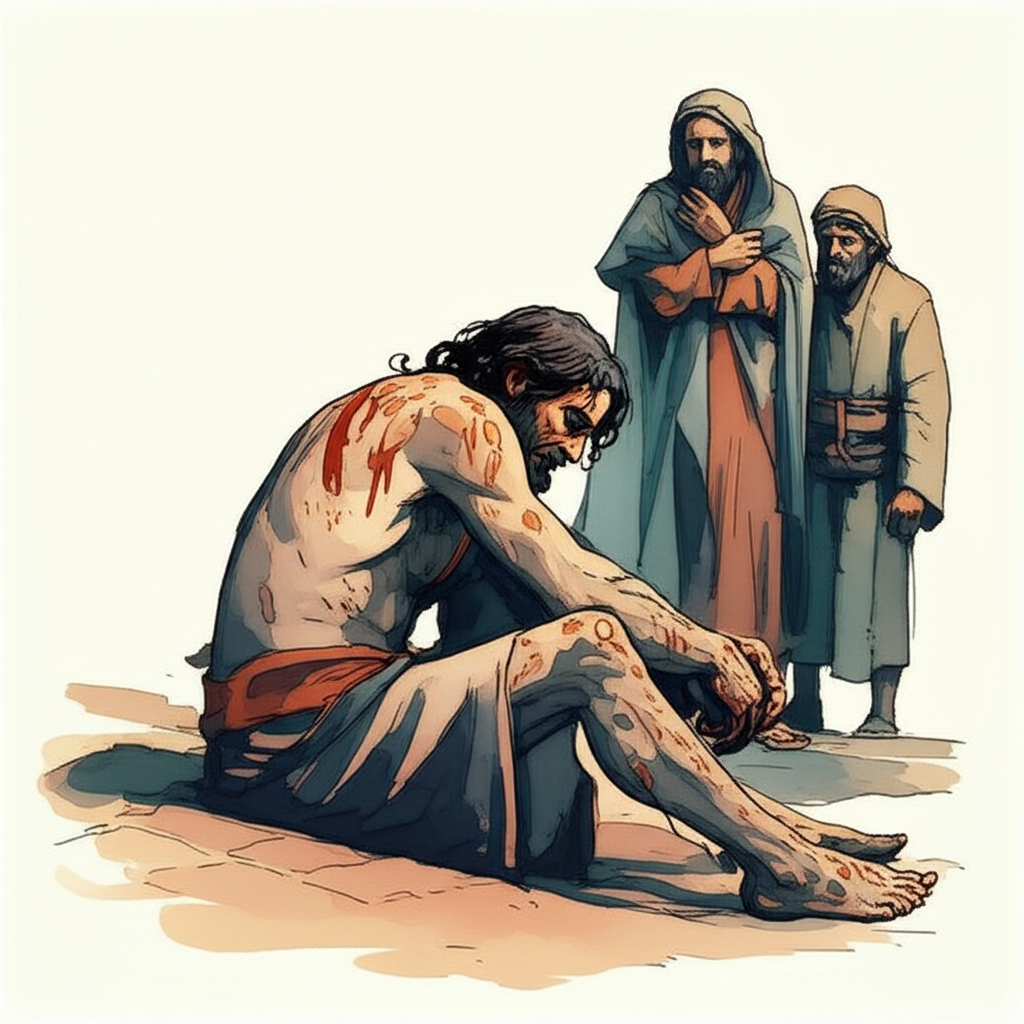Job 13 meaning explained in AI Summary
Job, frustrated with his friends' empty platitudes and accusations, declares that he will take his case directly to God.
Here are the key points:
- Job's Frustration: Job is tired of his friends' repetitive and unhelpful advice. He accuses them of being worthless physicians and warns them of God's judgment for their insincere words (13:1-12).
- Job's Boldness: Despite his suffering, Job maintains his integrity and boldly proclaims his desire to speak directly to God. He believes in God's justice and is willing to face Him, even if it means death (13:13-19).
- Job's Pleas: Job pleads with God for two things:
- Mercy: He asks God to lighten his suffering, acknowledging his own weakness and mortality (13:20-22).
- Clarity: He wants God to reveal his sins clearly so he can understand why he is being punished (13:23-28).
Overall, Chapter 13 marks a turning point in the book. Job shifts from arguing with his friends to directly confronting God, expressing both his frustration and unwavering faith. He is no longer content with human explanations for his suffering and seeks answers from the only one who can truly provide them.
Job 13 bible study ai commentary
Job 13 traces Job’s definitive shift from debating his friends to directly confronting God. Rejecting their shallow arguments and pious lies, Job silences them and prepares to take his case to the divine court. He expresses a raw, audacious faith, willing to face death itself for a hearing, convinced that his very approach to God is a testament to his innocence. The chapter culminates in Job's formal petition to God, pleading for the terms of a fair trial and demanding to know the charges against him.
Job 13 Context
The chapter unfolds within the framework of a quasi-legal proceeding, a common literary device in the Ancient Near East known as a rîḇ or covenant lawsuit. Job, the accused, dismisses his friends who have acted as inept prosecutors and character witnesses. He now moves to appeal directly to the Ultimate Judge. His arguments polemically target the simplistic Deuteronomic "retribution theology"—that righteousness always brings blessing and sin always brings immediate punishment—which his friends champion. Job's experience proves this formula false, and he is determined to make God Himself answer for the discrepancy.
Job 13:1-2
Behold, my eye has seen all this, my ear has heard and understood it. What you know, I also know; I am not inferior to you.
In-depth-analysis
- Job begins by asserting his intellectual and experiential equality with his friends. The verbs "seen" (rāʾā), "heard" (šāmaʿ), and "understood" (bîn) form a comprehensive claim to knowledge.
- He is not an uneducated man or a novice in theological matters. He is stating that he knows their arguments (the standard wisdom of the day) and finds them entirely insufficient to explain his situation.
- "I am not inferior to you" is a direct challenge to their condescending tone, setting the stage for him to dismiss them as counselors.
Bible references
- Job 12:3: "But I have understanding as well as you; I am not inferior to you. Who does not know such things as these?" (A direct parallel and continuation of this theme).
- 1 Corinthians 2:15: "The spiritual person judges all things, but is himself to be judged by no one." (Echoes the sentiment of having a higher understanding that others cannot properly assess).
Cross references
Prov 1:5 (a wise man will hear), Job 15:9 (Eliphaz's counter-claim), Job 42:3 (Job's eventual admission of limited knowledge before God).
Job 13:3-5
But I would speak to the Almighty, and I desire to argue my case with God. As for you, you whitewash with lies; worthless physicians are you all. Oh that you would keep silent, and it would be your wisdom!
In-depth-analysis
- Shift in Audience: This is the pivotal turn. Job moves from a horizontal debate with men to a vertical appeal to God (Shaddai, the Almighty).
- "Argue my case": The Hebrew hôḵēaḥ means to reason, argue, or reprove. It's a legal term. Job wants a formal hearing.
- "Whitewash with lies" (ṭōp̄əlê-šāqer): A powerful metaphor. They are not just mistaken; they are covering up the truth (or the lack of an answer) with falsehoods to maintain their theological system.
- "Worthless physicians": Their counsel is like a medicine that makes the patient sicker. Their "healing" words bring more pain because they are based on a false diagnosis.
- "Silence... your wisdom": A scathing indictment drawn from wisdom traditions. The most intelligent thing they could do is admit they have nothing meaningful to say.
Bible references
- Proverbs 17:28: "Even a fool who keeps silent is considered wise; when he closes his lips, he is deemed intelligent." (Job uses their own wisdom tradition against them).
- Jeremiah 8:22: "Is there no balm in Gilead? Is there no physician there? Why then has the health of the daughter of my people not been restored?" (Reflects the despair of having no effective healer for a deep wound).
- Isaiah 43:26: "Put me in remembrance; let us argue together; set forth your case, that you may be proved right." (Shows God inviting a legal argument, which is exactly what Job desires).
Cross references
Job 6:21 (useless comforters), Job 9:33-35 (desire for an umpire/mediator), Mk 5:26 (woman who suffered under many physicians).
Polemics
Scholars note that "whitewash with lies" is a critique of any theology that prioritizes a neat system over messy, honest reality. Job accuses his friends of defending God with untruths, suggesting that God does not need or want to be defended by falsehood. This is a timeless polemic against insincere or harmful apologetics.
Job 13:6-9
Hear now my reasoning, and listen to the pleadings of my lips. Will you speak wickedly for God, and talk deceitfully for him? Will you show partiality toward him? Will you plead the case for God? Will it be well with you when he searches you out? Or can you deceive him, as one deceives a man?
In-depth-analysis
- Job now prosecutes his friends. He questions their motive and integrity, accusing them of three things: speaking wickedly (ʿawlâ), speaking deceitfully (rǝmiyyâ), and showing partiality (pānîm tiśśāʾûn).
- "Speak wickedly for God": This is the core accusation. They believe they are defending God, but their arguments are unjust and untrue. They are lying on God's behalf.
- "Show partiality toward him": A legal term for favoring one party in a dispute, a perversion of justice. They are so determined to prove God right that they will condemn an innocent man without evidence.
- He warns them that God, the true judge who cannot be deceived, will see through their sycophantic defense and ultimately judge them for it.
Bible references
- Psalm 44:20-21: "If we had forgotten the name of our God... would not God discover this? For he knows the secrets of the heart." (God's omniscience makes deception impossible).
- Galatians 6:7: "Do not be deceived: God is not mocked, for whatever one sows, that will he also reap." (A warning against thinking one can fool God with false piety).
- Romans 2:11: "For God shows no partiality." (Job correctly understands that God does not need or accept the type of partiality forbidden in human courts, as in Lev 19:15).
Cross references
Lev 19:15 (no partiality in judgment), 1 Sam 16:7 (God sees the heart), Jer 17:10 (God searches the heart and mind).
Job 13:10-12
He will surely rebuke you if in secret you show partiality. Will not his majesty terrify you, and the dread of him fall upon you? Your maxims are proverbs of ashes; your defenses are defenses of clay.
In-depth-analysis
- Job predicts God's verdict on the friends. Their secret partiality, their hidden motive to flatter God, will be exposed and rebuked.
- He asks a rhetorical question: If they truly understood God's terrifying majesty (śǝʾētô), they would be too afraid to use such cheap, flimsy arguments on His behalf.
- "Proverbs of ashes... defenses of clay": Powerful imagery for the worthlessness of their arguments. Ashes are what's left after a fire—dead and formless. Clay defenses are weak and will crumble under pressure. Their theology has no substance or durability.
Bible references
- Isaiah 2:19: "And people shall enter the caves of the rocks... from before the terror of the LORD, and from the splendor of his majesty." (Illustrates the terrifying majesty Job mentions).
- Psalm 111:9: "He sent redemption to his people; he has commanded his covenant forever. Holy and awesome is his name!" (Captures the dread and majesty of God that should inspire reverence, not flattery).
Cross references
Job 4:12-21 (Eliphaz's own description of a terrifying vision), Isa 64:8 (we are the clay), Psa 39:11 (God's rebukes consume like a moth).
Job 13:13-16
Keep silent and let me speak, and let come on me what may. Why do I take my flesh in my teeth and put my life in my hand? Though he slay me, I will hope in him; yet I will argue my ways to his face. This will be my salvation, that a godless man shall not come before him.
In-depth-analysis
- "Take my flesh in my teeth... life in my hand": Idiomatic expressions for taking a desperate, life-threatening risk. He is betting everything on this confrontation with God.
- Verse 15 (Critical Verse): "Though he slay me, I will hope in him" (or, "I will wait for him").
- The Textual Issue: The Hebrew text (Kethiv) has lōʾ ("not"), suggesting "I have no hope." The marginal note (Qere) has lô ("to him" or "for him"), suggesting "I will hope in him," which the KJV follows.
- Interpretation 1 (No Hope): "He may slay me; I have no hope. Nevertheless, I will argue my case before him." This reading emphasizes Job's despair and sheer determination. He expects to die but demands justice anyway.
- Interpretation 2 (Hope in Him): "Though he slays me, my hope is still in Him." This highlights a profound, paradoxical trust that transcends his suffering and fear of death.
- Core Meaning: Either way, the main point is his defiant decision to argue his case (yāḵaḥ) directly before God. His action is an act of faith, regardless of the outcome.
- "This will be my salvation": His salvation/vindication lies in the very act of approaching God. He argues that a truly "godless man" (ḥānēp̄) would not dare to seek God's presence. Therefore, the fact that he is coming to God is proof of his fundamental integrity.
Bible references
- Daniel 3:17-18: "If this be so, our God whom we serve is able to deliver us... But if not, be it known to you, O king, that we will not serve your gods..." (The ultimate statement of faith that is not contingent on deliverance).
- Romans 8:38-39: "For I am sure that neither death nor life... will be able to separate us from the love of God in Christ Jesus our Lord." (The NT expression of faith that transcends death).
- Hebrews 4:16: "Let us then with confidence draw near to the throne of grace, that we may receive mercy and find grace to help in time of need." (Encapsulates Job's desire, which is ultimately fulfilled for believers through Christ).
Cross references
Jdg 12:3 (Jephthah taking his life in his hands), 1 Sam 19:5 (David putting his life in his hands), Psa 23:4 (walk through the valley of the shadow of death), Phil 1:20-21 (Christ magnified in my body, whether by life or by death).
Job 13:17-19
Listen carefully to my words, and let my declaration be in your ears. Behold, I have prepared my case; I know that I shall be vindicated. Who is there who will contend with me? For then I would be silent and die.
In-depth-analysis
- Job adopts formal, courtroom language. He is not just lamenting; he is making a legal declaration.
- "Prepared my case" (ʿāraḵtî mišpāṭ): He has organized his evidence and arguments for a formal trial.
- "I shall be vindicated" (’anî ’eṣdāq): A bold declaration of confidence. This is not a confession of sinlessness but of fundamental integrity. He knows his suffering is not proportional to any sin he has committed.
- "Who is there who will contend with me?": A legal challenge, daring any adversary (human or divine) to bring a charge against him. If a legitimate charge were presented, he says he would accept his fate ("be silent and die").
Bible references
- Isaiah 50:8-9: "He who vindicates me is near. Who will contend with me? Let us stand up together. Who is my adversary? Let him come near to me." (A remarkably similar statement of faith from the Lord's servant).
- Romans 8:33-34: "Who shall bring any charge against God's elect? It is God who justifies. Who is to condemn?" (The Christian's ultimate confidence in vindication, echoing Job's plea).
Cross references
Gal 2:16 (justified by faith), Isa 41:21 (Set forth your case), Psa 143:2 (no one living is righteous before you).
Job 13:20-24
Only grant me two things, then I will not hide myself from your face: withdraw your hand far from me, and let not the dread of you terrify me. Then call, and I will answer; or let me speak, and you reply to me. How many are my iniquities and my sins? Make me know my transgression and my sin. Why do you hide your face and count me as your enemy?
In-depth-analysis
- Two Conditions: Job lays out his terms for a trial.
- Remove the Suffering: "Withdraw your hand." He cannot plead his case while being actively crushed by affliction.
- Remove the Overwhelming Terror: He needs a "level playing field" where he is not incapacitated by the terrifying majesty of the Almighty.
- Demand for a "Bill of Charges": "Make me know my transgression and my sin." This is the central question of the book. If he is being punished for sin, he demands to be told what that sin is.
- "Why do you hide your face?": This is the cry of dereliction, feeling God's absence. It is worse than the suffering itself.
- "Count me as your enemy": Job perceives God's actions not as fatherly discipline but as hostile aggression.
Bible references
- Genesis 32:26: "But Jacob said, 'I will not let you go unless you bless me.'" (Demonstrates a similar wrestling with God, refusing to relent without a response).
- Psalm 39:10: "Remove your stroke from me; I am spent by the hostility of your hand." (A similar plea to have affliction removed in order to speak).
- Psalm 13:1: "How long, O LORD? Will you forget me forever? How long will you hide your face from me?" (A classic expression of the pain of divine hiddenness).
Cross references
Psa 88:14 (Lord, why do you cast my soul away?), Lam 2:5 (the Lord has become like an enemy), Exo 33:18-23 (Moses's desire to see God, but God's glory must be mediated).
Job 13:25-28
Will you frighten a driven leaf and pursue dry chaff? For you write bitter things against me and make me inherit the iniquities of my youth. You put my feet in the stocks and watch all my paths; you set a limit for the soles of my feet, while I am wasting away like a rotten thing, like a garment that is moth-eaten.
In-depth-analysis
- Contrast in Power: Job juxtaposes God's infinite power with his own pathetic frailty. He is a "driven leaf" and "dry chaff"—powerless and insignificant. Why would an almighty God torment something so weak?
- "Iniquities of my youth": In the absence of a present, major sin, Job desperately speculates that God is dredging up old, forgotten sins from his past to punish him.
- Images of a Prisoner:
- "Feet in the stocks": Immobilized, imprisoned.
- "Watch all my paths... set a limit": Under constant, inescapable surveillance. He feels trapped.
- Images of Decay: He ends the chapter by describing himself as a "rotten thing" (rāqāḇ) and a "moth-eaten" garment, conveying a sense of slow, inevitable decay and utter worthlessness under God's scrutiny.
Bible references
- Psalm 1:4: "The wicked are not so, but are like chaff that the wind drives away." (Job applies this image of the wicked to himself, showing his confusion).
- Psalm 25:7: "Remember not the sins of my youth or my transgressions; according to your steadfast love remember me, for the sake of your goodness, O LORD!" (The psalmist asks God not to do what Job fears He is doing).
- Hosea 5:12: "Therefore I am like a moth to Ephraim, and like dry rot to the house of Judah." (God Himself uses the imagery of a moth and rot to describe his judgment).
Cross references
Isa 40:24 (blown away like chaff), Lam 3:7 (He has walled me about), Job 33:11 (Elihu repeating Job's complaint).
Job chapter 13 analysis
- The Problem of "Pious" Lies: The chapter serves as a powerful polemic against defending God with false or simplistic arguments. Job's assertion that his friends "speak wickedly for God" (v. 7) is a crucial theological statement. It implies that God is more honored by raw, honest complaint than by a defense built on untruths. Truthfulness is a higher virtue than defending God's reputation with platitudes.
- Faith as Confrontation: Job 13 redefines faith. It is not passive acceptance. Here, faith is active, defiant, and confrontational. Job's determination to argue with God, even if it kills him, is an expression of his belief that there is a relationship to be had and a just character to appeal to. He would not address a void.
- Prefiguring the Need for a Mediator: Job's conditions for a trial—remove the suffering and the terror (vv. 20-21)—highlight the impossible gulf between man and God. Man cannot approach a holy God on his own terms. This reinforces Job's earlier cry for a "mediator" or "umpire" (Job 9:33) and points prophetically to the New Testament reality of Christ as the one who bridges this gap, allowing humanity to "draw near to the throne of grace with confidence" (Heb. 4:16).
- Legal Confidence vs. Sinlessness: Job’s statement, "I know that I shall be vindicated" (v. 18), is not a claim of perfect sinlessness. It is a legal declaration of his innocence regarding the accusation that his suffering is a direct result of some great, hidden sin. It is confidence in his own case before the court.
### Job 13 summaryJob authoritatively silences his friends, dismissing their counsel as "proverbs of ashes" and "lies." He boldly declares his intention to take his case directly to God, expressing a paradoxical faith that he will argue his ways before God even if it means his death. He formally petitions God for a trial, asking for relief from his suffering and terror so he can receive the charges against him, ending with a lament on his own frailty in the face of God’s perceived hostility.
Job 13 AI Image Audio and Video










Job chapter 13 kjv
- 1 Lo, mine eye hath seen all this, mine ear hath heard and understood it.
- 2 What ye know, the same do I know also: I am not inferior unto you.
- 3 Surely I would speak to the Almighty, and I desire to reason with God.
- 4 But ye are forgers of lies, ye are all physicians of no value.
- 5 O that ye would altogether hold your peace! and it should be your wisdom.
- 6 Hear now my reasoning, and hearken to the pleadings of my lips.
- 7 Will ye speak wickedly for God? and talk deceitfully for him?
- 8 Will ye accept his person? will ye contend for God?
- 9 Is it good that he should search you out? or as one man mocketh another, do ye so mock him?
- 10 He will surely reprove you, if ye do secretly accept persons.
- 11 Shall not his excellency make you afraid? and his dread fall upon you?
- 12 Your remembrances are like unto ashes, your bodies to bodies of clay.
- 13 Hold your peace, let me alone, that I may speak, and let come on me what will.
- 14 Wherefore do I take my flesh in my teeth, and put my life in mine hand?
- 15 Though he slay me, yet will I trust in him: but I will maintain mine own ways before him.
- 16 He also shall be my salvation: for an hypocrite shall not come before him.
- 17 Hear diligently my speech, and my declaration with your ears.
- 18 Behold now, I have ordered my cause; I know that I shall be justified.
- 19 Who is he that will plead with me? for now, if I hold my tongue, I shall give up the ghost.
- 20 Only do not two things unto me: then will I not hide myself from thee.
- 21 Withdraw thine hand far from me: and let not thy dread make me afraid.
- 22 Then call thou, and I will answer: or let me speak, and answer thou me.
- 23 How many are mine iniquities and sins? make me to know my transgression and my sin.
- 24 Wherefore hidest thou thy face, and holdest me for thine enemy?
- 25 Wilt thou break a leaf driven to and fro? and wilt thou pursue the dry stubble?
- 26 For thou writest bitter things against me, and makest me to possess the iniquities of my youth.
- 27 Thou puttest my feet also in the stocks, and lookest narrowly unto all my paths; thou settest a print upon the heels of my feet.
- 28 And he, as a rotten thing, consumeth, as a garment that is moth eaten.
Job chapter 13 nkjv
- 1 "Behold, my eye has seen all this, My ear has heard and understood it.
- 2 What you know, I also know; I am not inferior to you.
- 3 But I would speak to the Almighty, And I desire to reason with God.
- 4 But you forgers of lies, You are all worthless physicians.
- 5 Oh, that you would be silent, And it would be your wisdom!
- 6 Now hear my reasoning, And heed the pleadings of my lips.
- 7 Will you speak wickedly for God, And talk deceitfully for Him?
- 8 Will you show partiality for Him? Will you contend for God?
- 9 Will it be well when He searches you out? Or can you mock Him as one mocks a man?
- 10 He will surely rebuke you If you secretly show partiality.
- 11 Will not His excellence make you afraid, And the dread of Him fall upon you?
- 12 Your platitudes are proverbs of ashes, Your defenses are defenses of clay.
- 13 "Hold your peace with me, and let me speak, Then let come on me what may!
- 14 Why do I take my flesh in my teeth, And put my life in my hands?
- 15 Though He slay me, yet will I trust Him. Even so, I will defend my own ways before Him.
- 16 He also shall be my salvation, For a hypocrite could not come before Him.
- 17 Listen carefully to my speech, And to my declaration with your ears.
- 18 See now, I have prepared my case, I know that I shall be vindicated.
- 19 Who is he who will contend with me? If now I hold my tongue, I perish.
- 20 "Only two things do not do to me, Then I will not hide myself from You:
- 21 Withdraw Your hand far from me, And let not the dread of You make me afraid.
- 22 Then call, and I will answer; Or let me speak, then You respond to me.
- 23 How many are my iniquities and sins? Make me know my transgression and my sin.
- 24 Why do You hide Your face, And regard me as Your enemy?
- 25 Will You frighten a leaf driven to and fro? And will You pursue dry stubble?
- 26 For You write bitter things against me, And make me inherit the iniquities of my youth.
- 27 You put my feet in the stocks, And watch closely all my paths. You set a limit for the soles of my feet.
- 28 "Man decays like a rotten thing, Like a garment that is moth-eaten.
Job chapter 13 niv
- 1 "My eyes have seen all this, my ears have heard and understood it.
- 2 What you know, I also know; I am not inferior to you.
- 3 But I desire to speak to the Almighty and to argue my case with God.
- 4 You, however, smear me with lies; you are worthless physicians, all of you!
- 5 If only you would be altogether silent! For you, that would be wisdom.
- 6 Hear now my argument; listen to the pleas of my lips.
- 7 Will you speak wickedly on God's behalf? Will you speak deceitfully for him?
- 8 Will you show him partiality? Will you argue the case for God?
- 9 Would it turn out well if he examined you? Could you deceive him as you might deceive a mortal?
- 10 He would surely call you to account if you secretly showed partiality.
- 11 Would not his splendor terrify you? Would not the dread of him fall on you?
- 12 Your maxims are proverbs of ashes; your defenses are defenses of clay.
- 13 "Keep silent and let me speak; then let come to me what may.
- 14 Why do I put myself in jeopardy and take my life in my hands?
- 15 Though he slay me, yet will I hope in him; I will surely defend my ways to his face.
- 16 Indeed, this will turn out for my deliverance, for no godless person would dare come before him!
- 17 Listen carefully to what I say; let my words ring in your ears.
- 18 Now that I have prepared my case, I know I will be vindicated.
- 19 Can anyone bring charges against me? If so, I will be silent and die.
- 20 "Only grant me these two things, God, and then I will not hide from you:
- 21 Withdraw your hand far from me, and stop frightening me with your terrors.
- 22 Then summon me and I will answer, or let me speak, and you reply to me.
- 23 How many wrongs and sins have I committed? Show me my offense and my sin.
- 24 Why do you hide your face and consider me your enemy?
- 25 Will you torment a windblown leaf? Will you chase after dry chaff?
- 26 For you write down bitter things against me and make me reap the sins of my youth.
- 27 You fasten my feet in shackles; you keep close watch on all my paths by putting marks on the soles of my feet.
- 28 "So man wastes away like something rotten, like a garment eaten by moths.
Job chapter 13 esv
- 1 "Behold, my eye has seen all this, my ear has heard and understood it.
- 2 What you know, I also know; I am not inferior to you.
- 3 But I would speak to the Almighty, and I desire to argue my case with God.
- 4 As for you, you whitewash with lies; worthless physicians are you all.
- 5 Oh that you would keep silent, and it would be your wisdom!
- 6 Hear now my argument and listen to the pleadings of my lips.
- 7 Will you speak falsely for God and speak deceitfully for him?
- 8 Will you show partiality toward him? Will you plead the case for God?
- 9 Will it be well with you when he searches you out? Or can you deceive him, as one deceives a man?
- 10 He will surely rebuke you if in secret you show partiality.
- 11 Will not his majesty terrify you, and the dread of him fall upon you?
- 12 Your maxims are proverbs of ashes; your defenses are defenses of clay.
- 13 "Let me have silence, and I will speak, and let come on me what may.
- 14 Why should I take my flesh in my teeth and put my life in my hand?
- 15 Though he slay me, I will hope in him; yet I will argue my ways to his face.
- 16 This will be my salvation, that the godless shall not come before him.
- 17 Keep listening to my words, and let my declaration be in your ears.
- 18 Behold, I have prepared my case; I know that I shall be in the right.
- 19 Who is there who will contend with me? For then I would be silent and die.
- 20 Only grant me two things, then I will not hide myself from your face:
- 21 withdraw your hand far from me, and let not dread of you terrify me.
- 22 Then call, and I will answer; or let me speak, and you reply to me.
- 23 How many are my iniquities and my sins? Make me know my transgression and my sin.
- 24 Why do you hide your face and count me as your enemy?
- 25 Will you frighten a driven leaf and pursue dry chaff?
- 26 For you write bitter things against me and make me inherit the iniquities of my youth.
- 27 You put my feet in the stocks and watch all my paths; you set a limit for the soles of my feet.
- 28 Man wastes away like a rotten thing, like a garment that is moth-eaten.
Job chapter 13 nlt
- 1 "Look, I have seen all this with my own eyes
and heard it with my own ears, and now I understand. - 2 I know as much as you do.
You are no better than I am. - 3 As for me, I would speak directly to the Almighty.
I want to argue my case with God himself. - 4 As for you, you smear me with lies.
As physicians, you are worthless quacks. - 5 If only you could be silent!
That's the wisest thing you could do. - 6 Listen to my charge;
pay attention to my arguments. - 7 "Are you defending God with lies?
Do you make your dishonest arguments for his sake? - 8 Will you slant your testimony in his favor?
Will you argue God's case for him? - 9 What will happen when he finds out what you are doing?
Can you fool him as easily as you fool people? - 10 No, you will be in trouble with him
if you secretly slant your testimony in his favor. - 11 Doesn't his majesty terrify you?
Doesn't your fear of him overwhelm you? - 12 Your platitudes are as valuable as ashes.
Your defense is as fragile as a clay pot. - 13 "Be silent now and leave me alone.
Let me speak, and I will face the consequences. - 14 Why should I put myself in mortal danger
and take my life in my own hands? - 15 God might kill me, but I have no other hope.
I am going to argue my case with him. - 16 But this is what will save me ? I am not godless.
If I were, I could not stand before him. - 17 "Listen closely to what I am about to say.
Hear me out. - 18 I have prepared my case;
I will be proved innocent. - 19 Who can argue with me over this?
And if you prove me wrong, I will remain silent and die. - 20 "O God, grant me these two things,
and then I will be able to face you. - 21 Remove your heavy hand from me,
and don't terrify me with your awesome presence. - 22 Now summon me, and I will answer!
Or let me speak to you, and you reply. - 23 Tell me, what have I done wrong?
Show me my rebellion and my sin. - 24 Why do you turn away from me?
Why do you treat me as your enemy? - 25 Would you terrify a leaf blown by the wind?
Would you chase dry straw? - 26 "You write bitter accusations against me
and bring up all the sins of my youth. - 27 You put my feet in stocks.
You examine all my paths.
You trace all my footprints. - 28 I waste away like rotting wood,
like a moth-eaten coat.
- Bible Book of Job
- 1 Story of Job
- 2 Satan Attacks Job's Health
- 3 Job Laments His Birth
- 4 Eliphaz Speaks: The Innocent Prosper
- 5 Call now; is there anyone who will answer you? To which of the holy ones will
- 6 Job Replies: My Complaint Is Just
- 7 Job Continues: My Life Has No Hope
- 8 Bildad Speaks: Job Should Repent
- 9 Job Replies: There Is No Arbiter
- 10 Job Continues: A Plea to God
- 11 Zophar Speaks: You Deserve Worse
- 12 Job Replies: The Lord Has Done This
- 13 Job Continues: Still I Will Hope in God
- 14 Job Continues: Death Comes Soon to All
- 15 Eliphaz Accuses: Job Does Not Fear God
- 16 Job Replies: Miserable Comforters Are You
- 17 Job Continues: Where Then Is My Hope?
- 18 Bildad Speaks: God Punishes the Wicked
- 19 Job Replies: My Redeemer Lives
- 20 Zophar Speaks: The Wicked Will Suffer
- 21 Job Replies: The Wicked Do Prosper
- 22 Eliphaz Speaks: Job's Wickedness Is Great
- 23 Job Replies: Where Is God?
- 24 Why are not times of judgment kept by the Almighty, and why do those who know
- 25 Bildad Speaks: Man Cannot Be Righteous
- 26 Job Replies: God's Majesty Is Unsearchable
- 27 Job Continues: I Will Maintain My Integrity
- 28 Job Continues: Where Is Wisdom?
- 29 Job's Summary Defense
- 30 But now they laugh at me, men who are younger than I, whose fathers I would
- 31 Covenant with my Eyes
- 32 Elihu Rebukes Job's Three Friends
- 33 Elihu Rebukes Job
- 34 Elihu Asserts God's Justice
- 35 Elihu Condemns Job
- 36 Elihu Extols God's Greatness
- 37 Elihu Proclaims God's Majesty
- 38 Job questions God
- 39 Do you know when the mountain goats give birth? Do you observe the calving of
- 40 Job Promises Silence
- 41 Lord's challenge of Leviathan
- 42 Job's Repentance and Restoration